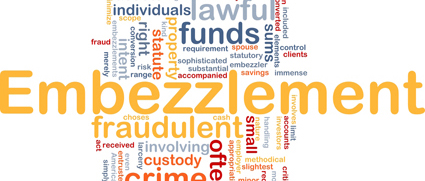Defending card issuers against employee embezzlement claims
Rising number of suits sends issuers to helpful precedents
- |
- Written by Brett D. Watson

Typically, employee embezzlement occurs when a bookkeeper or other trusted employee forges signatures on an employer’s blank checks, or utilizes a charge card issued to their employer. For reasons we’ll explore, these scenarios often result in suits against charge card issues. Indeed, there has been a spike in such cases. These in many cases are meritless--and costly--claims against issuers. This article will review common defenses to such claims.
What do such cases look like? A bit more than a year ago, the half-brother and former business manager of stand-up comedian Dane Cook was convicted of embezzling millions of dollars from the comedian. Beginning in 2004, the brother began siphoning money from Cook’s accounts. He allegedly stole $3 million in a single check by forging Cook’s signature. In October 2010, he pleaded guilty and was ultimately ordered to pay $12 million in restitution to Cook.
In Cook’s case, the wrongdoer was ordered to pay restitution. However, in many cases when the employer discovers the embezzlement there is little economic utility in pursuing the employee because he or she has either spent the money and is judgment-proof, or has been jailed. Employers, unwilling to admit their own failure to properly supervise their employees, look to the only deep pocket they can find--their banks and charge card issuers.
In order to understand the development of defenses available to charge card issuers, I must start with a brief synopsis of the typical defense to embezzlement claims involving check forgery, and the associated duties imposed upon employers.
In such cases, the UCC and analogous state laws place the burden on employers to timely review their monthly account statements and report the loss. Specifically, Commercial Code Section 4-406 provides for claims preclusion. Upon receipt of a monthly account statement, Section 4-406 requires the employer to report unauthorized checks within a period “not exceeding 30 days.” Although this “30 day” requirement can be rebutted by a showing that the bank was contributorily negligent, Section 4-406 also provides that:
“[w] ithout regard to care or lack of care of either the customer or the bank, a customer who does not within one year after the statement or items are made available to the customer … discover and report the customer's unauthorized signature on or any alteration on the item is precluded from asserting against the bank the unauthorized signature or alteration.”
This one-year absolute time bar is premised largely upon public policy considerations--namely, that the employer is always in a better position than its bank to discover bookkeeper fraud simply by properly supervising its employees and exercising its duty to review monthly account statements.
However, when the embezzlement is perpetrated through the use of charge cards, , a significant problem arises because in many instances there are not any “easy to spot” indicia of fraud, and consumer protection statutes such as the Truth In Lending Act (TILA) add a few extra layers to the analysis. In order to effectively defend such claims, bank personnel and attorneys must have a thorough understanding of TILA and the implementing Federal Reserve Board Regulation Z.
As with the checking cases, TILA provides for a one-year statute of limitation. (See 15 USC 1640(e)) This has been interpreted strictly, even where the wrongdoer has engaged in activity that makes it difficult for the cardholder to detect the fraud. Azur v. Chase Bank, USA, Nat. Ass'n., 601 F. 3d 212 (3d Cir. 2010). Assuming the claim is brought within one-year, the typical defense is focused on one or both of two key issues--timely reporting, and unauthorized use.
In order to satisfy the reporting requirements, the employer is required to give “adequate notice” to the card issuer. (15 USC 1643) This is typically interpreted to be a short time period, and developed out of the common law checking requirement to inspect monthly statements.
The key decision discussing the timely reporting issue is Minskoff v. American Express Travel Related Services Company, Inc. (98 F.3d 703 (2nd Cir. 1996).) Minskoff maintained a business card account with American Express. One card was issued, in Minskoff’s name only. Minskoff hired a personal assistant who, without Minskoff’s authority or knowledge, obtained a supplemental card in her name. Between August 1992 and November 1993, 16 monthly statements were sent to Minskoff reflecting charges of approximately $250,000 initiated by the assistant, compared to the mere $10,000 initiated by Minskoff.
Under TILA, the court held that Minskoff was not liable for the assistant’s opening of the supplemental account. However, Minskoff was liable for all activity after the first monthly statement was provided. The court held that Minskoff had a duty to inspect his statements. The court noted that “[n]othing in the TILA suggests that Congress intended to sanction intentional or negligent conduct by the cardholder that furthers the fraud or theft of an unauthorized card user.” The statements clearly showed that a supplemental card had been issued in the assistant’s name, and itemized the charges initiated by the assistant. Therefore, after Minskoff received the first statement, he was in the better position to detect the fraud, given that all he had to do was timely review his monthly statements.
Another more recent case that applies the Minskoff rationale is Carrier v. Citibank (South Dakota), N.A., 180 Fed.Appx. 286 (2d Cir. 2006). In Carrier, an employer failed to review his charge card statements and checks presented to him by his secretary, and therefore failed to notice that each statement included personal charges incurred by his secretary. Applying Minskoff, the court held that the employer’s failure to examine credit card statements that could have revealed the fraudulent use “constitutes a negligent omission.”
If the employer is able to establish timely notice, the defense will then shift to whether or not the use was “unauthorized.” As defined by TILA, the term “unauthorized use” means “use of a credit card by a person other than the cardholder who does not have actual, implied, or apparent authority for such use and from which the cardholder receives no benefit.” ( Italics added; 15 USC 1602(o) ). In turn, “cardholder” is defined as “any person to whom a credit card is issued or any person who has agreed with the card issuer to pay obligations arising from the issuance of a credit card to another person.” (15 USC 1602(m).)
For charge activity to be “authorized,” the specific activity need not be expressly authorized by the employer. Rather, the authority can be implied or apparent. Implied or apparent authority arises from the employer’s failure to timely report the usage and/or upon payment of charges initiated by the employee.
Further developing the concepts laid out in Minskoff, the court in DBI Architects, P.C. v. American Express Travel Related Services Company, Inc., (388 F.3d 886 (U.S.App.D.C. 2004)) held that repeated payment of monthly charges without protest constitutes apparent authority. In DBI Architects, DBI hired an accounting manager who controlled accounts receivable and accounts payable, and was entrusted with the duty of affixing authorized signatures to checks and other documents. As in Minskoff, the accounting manager added herself as a supplemental cardholder without the knowledge of DBI. From August 2001 through May 2002, the accounting manager charged a total of $134,000 in charges on DBI’s account.
During this time, American Express sent ten monthly account statements, each listing the accounting manager as a cardholder and itemizing her charges. DBI, through checks written by the accounting manager, paid each of these bills. The DBI court limited Minskoff in certain respects because, here; the court held that failure to inspect monthly statements, alone, did not constitute negligence sufficient to create apparent authority. However, DBI’s failure to inspect coupled with repeatedly paying the bills without protest created apparent authority for the accounting manager’s usage. Subsequent courts have similarly found apparent authority based simply upon the payment of charges, even if payments for the fraudulent charges are made without the knowledge of the employer. (Azur v. Chase Bank, USA, Nat. Ass'n, 601 F. 3d 212 (3d Cir. 2010).)
Although not an employee embezzlement case, one of the most useful and instructional cases on the issue of authorized use is Walker Bank & Trust Co. v. Jones (672 P.2d 72 (Utah, 1983)). In Walker Bank, Mrs. Jones established Visa and MasterCard accounts at Walker Bank. Her husband was a supplemental cardholder.
After their marriage became troubled, Mrs. Jones wrote to the bank indicating that she would no longer honor charges made by her husband on the account. The bank requested return of the cards. But both Mr. and Mrs. Jones retained their cards and continued to make charges against the account.
Only after several months did Mrs. Jones surrender the cards, leaving a balance on the combined accounts of $2,700. Mrs. Jones refused to pay the balance, and the bank sued. The court found no unauthorized use. Following an exhaustive discussion of notice and authorized use, the court stated that notification to the card issuer has no bearing on whether the use is unauthorized. As a matter of agency law, Mr. Jones had “apparent authority” to continue use of the card because he had previously been issued a card and his name appeared on it.
Further, the cardholders’ failure to surrender their cards justified the bank’s refusal to terminate their liability. The court reasoned that “justice is better served by placing the responsibility for the credit escapades of an errant spouse (or son, daughter, mother, father, etc.) on the cardholder rather than the Bank.”
So, utilizing the rationale of Walker Bank, a card issuer could similarly argue that risk of loss associated with the errant spending of a bookkeeper or trusted employee is more appropriately borne by the employer, as the giving of a card to an employee establishes apparent authority for any errant spending.
Apparent authority has also been found where explicit limited authority is granted, and subsequently exceeded. (Martin v. American Express (361 So.2d 597 (Ala. Civ. App. 1978).)
In Martin, a cardholder was found liable for $5,300 in charges made by a business associate who was only granted authority to charge up to $1,000. The court held that the cardholder had given his business associate the appearance of authority.
In so holding, the court reasoned that TILA was meant to protect consumers from loss, theft, or wrongdoing; it was not meant to protect consumers when they voluntarily give their charge card to another. To hold otherwise could permit unscrupulous cardholders the means to conspire with another to charge excessive amounts that the cardholder would later claim were unauthorized.
The defenses outlined herein can insulate card issuers from liability. An employer’s failure to properly supervise their employees, review their monthly account statements, and timely report any suspected unauthorized transactions provides a framework for a solid defense, thereby preventing the employer from finding a scapegoat.
|
About the author |
 |
Tagged under Technology, Risk Management,













